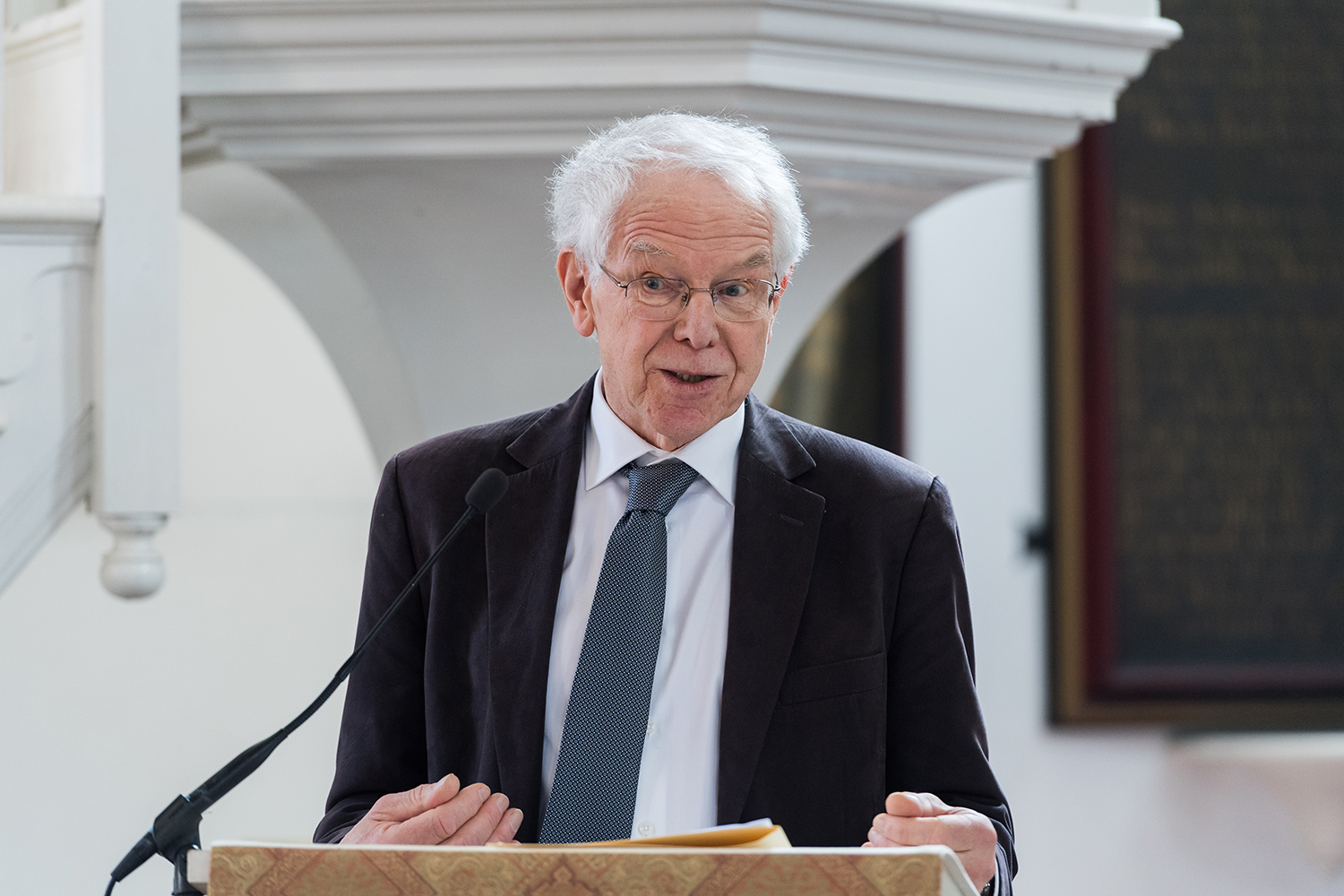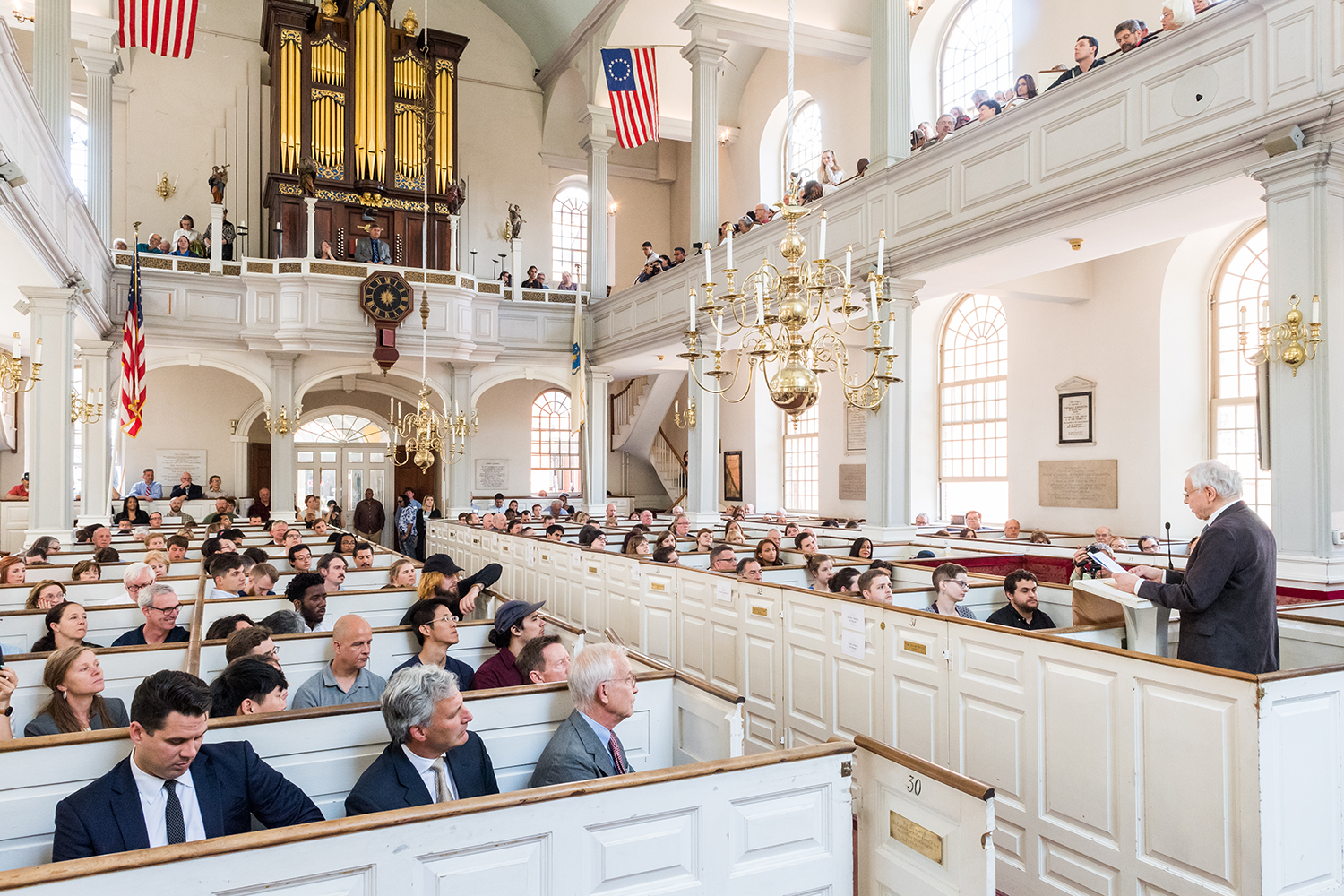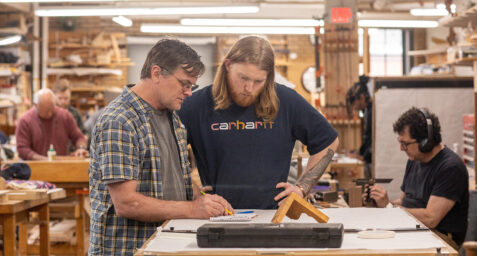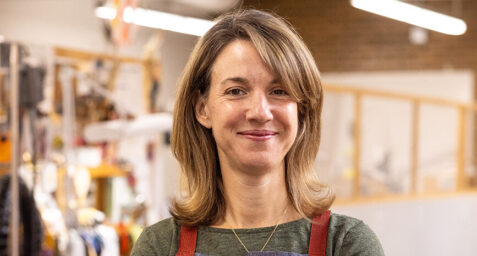Graduation 2017: Keynote speaker Eric Schandall

Categories
AlumniThe 136th commencement at North Bennet Street School was full of smiling faces, proud families, and a strong sense of accomplishment all around. These new graduates spent the last year or more in carpentry classes, jewelry making classes, locksmithing classes, bookbinding classes, and a host of other programs at one of the nation’s top trade schools. And as one speaker shared, they should be “justifiably proud of a job well done.”
We welcomed 94 graduates into the alumni community this year. They have a variety of backgrounds and hail from locations around the world, representing one of the most diverse classes ever.
The ceremony was held at a packed Old North Church just a few block away from NBSS in Boston’s historic North End neighborhood. A host of speakers, from our President Miguel Gómez-Ibáñez CF ’99 to Chair of our Board of Directors Marc Marguilies, shared their insights with the new graduates as they embark on careers in craft and trade. In addition, Eric Schandall PT ’67 served as both as the Commencement Speaker and the 2017 winner of the Distinguished Alumni Award. This the first time in our 136-year history that an individual has received both honors.
View highlights from graduation in the video above, and check out dozens of exciting photos from graduation here. You can also read a full transcript of Eric’s speech below.
Eric Schandall PT ’67
Graduation Speaker and Distinguished Alumni Award Winner
Welcome everyone! I would like to recognize Marc Margulies, Chair of the Board of Directors; Miguel Gómez-Ibáñez, President of North Bennet Street School; Michael Wilson, Alumni Association President; Members of the Board, faculty, graduates, families and friends—greetings to you all.
Here we are, ready to honor the North Bennet Street School Graduating Class of 2017. There is no day that is a simple day, and this one especially is ripe with expectations, relief, a little poignancy, pride in accomplishment, gratitude, some anxiety for what comes next, and emotions that are standing at attention not far away.
Congratulations to the graduates are in order. You have made many decisions that have brought you to this point in your lives and your careers. The moment when the door of new possibilities opens, when that happens there is the choice to go through that door, or to say no, and stay where you were before the chance came. Not only should you be congratulated for the accomplishments you have made in order to graduate, but initially for daring to go through the door that led you here.
The moment when the door of new possibilities opens, when that happens there is the choice to go through that door, or to say no, and stay where you were before the chance came. Not only should you be congratulated for the accomplishments you have made in order to graduate, but initially for daring to go through the door that led you here.
I must pause to thank those who nominated me to receive the Alumnus of the Year Award. It was more than generous to be asked to come speak to you today, to be here with you, and receiving the Award in addition is a little overwhelming. I am very grateful to have been recognized with this distinction. I frankly do not get why I was singled out for this award, but I am touched to be remembered at the School, and by many friends. To be recognized by your peers is touching and doubly impactful. Thank you very much for this Award.
In the rest of the speech I will relate some history, along with a little of what has happened since leaving the School fifty years ago. (In fifteen minutes, I am allowed 3.3333 years per minute, but will do my best!) While some of my comments are specifically to graduating piano technicians, in spirit I will address all of the graduates.
When I was newly married and casting about for something to do, a friend suggested learning to tune pianos. I was playing piano a bit and it seemed to be a prospect. We were living here in the North End then and I thumbed through the Yellow Pages (remember them?) looking for someone to inquire about learning to tune. The first person I called was living just up on Tileston Street, a man named Harold Marshman. He said, “Well, it would be difficult to find someone who was good, who also had the time and the aptitude for teaching.” But he was running a school for piano technicians on Tileston Street, at the North Bennet Street Industrial School. Would I be interested?
We met and I decided to enroll in the class. At that time, one could attend six days a week, 10 hours a day, and graduate in three or four months, ready as it were, to go to work. The cost was $600. We were living in a one-bedroom apartment for forty dollars a month, before moving to one that was thirty dollars a month, and tuning fees were $15. It doesn’t seem fair when compared to today and the difficult financial burdens you have had to navigate.
So began the work that I am still doing now, fifty years later. In that time, I never had to discard anything that was taught at the School. That speaks well for the quality of the school, a high quality that continues to be evident today. What also began was a friendship with Harold, and with the second teacher, Eddie Coughlin. I can tell you now that the time with your teachers doesn’t end when you leave school and set out on your own. It is just the start of a relationship you have with them not only as long as they live, but as long as you live. They are still there, looking over your work and your life, and if you had high regard for them as a student, it is only a small fraction of the love and gratitude you have for them as you go through the decades to come.
Harold was a refined and interesting man. He was an accomplished pianist and recorder player. He had been personnel manager for the Chicago Symphony Orchestra in the nineteen-thirties and forties where he met many of the great artists of the day. When we met he was in his sixties I suppose, living in the school and running it with Eddie. He taught tuning and Eddie taught regulating and repairing, teaching alternate days. He had more than what a church mouse had to live on, but not much more, and the parish that church mouse lived in was not a wealthy one. There were only four students in our class as I recall. It was a labor of love and service for Harold.
Bill Garlick attended the School beginning in the next class after I graduated. He became a good friend. For Eddie, I think he looked on Bill as a son. They were very close friends, and together ensured the continuation of the School after Harold passed away. We owe so much to everyone who has contributed to the school and kept it alive and vital. Present company included!
Eddie’s father worked at the McPhail Piano Company at the foundry, casting plates. Eddie got a job there and told the story about learning the business in the factory. His foreman would come to look at his work and pass judgment on it. “No, it’s not right Eddie, do it again. No, still not right, do it again.” This went on three or four times until, “Ok, now it’s right.” Eddie went into the Army at the tail end of the First World War and was away about a year or so. When he returned he went back to his old job, same factory, and same foreman. When the foreman came to look at his work Eddie said that he heard him say something he had never heard before. “It’s good enough Eddie!”
So, the slide in standards has been going on a long time. Is good enough, good enough? This is where you come in. In your work you can make it right to your standards. You will set the mark for what is right or wrong in your work, in your attitude, and within the confines of your economy.
So, how do we come to decide what work we will do in our lives? It is rare to know early on what direction we will take in our work. We normally start by asking the question, “What am I going to do with my life?” It might be better to ask: “What is life wanting to do with me?” The next question is, “Do I have the courage to do what it seems life is asking me to do?” This is a process.
So, how do we come to decide what work we will do in our lives? It is rare to know early on what direction we will take in our work. We normally start by asking the question, “What am I going to do with my life?” It might be better to ask: “What is life wanting to do with me?” The next question is, “Do I have the courage to do what it seems life is asking me to do?” This is a process.
The American poet Gary Snyder told the story of a drifter friend who came to see him from time to time in the Sierra Nevada Mountains. They were hiking one day and his friend said, “Gary, do think the trees see us when we walk by?” Gary said he didn’t know, and had never thought about it. His friend said, “Well, we walk past really fast, might not be time enough for them to see us.” And this was about the trees. What about the rocks, how long for them to see us, and then decide what they want to do with us?
We need to be still long enough for the place where we are to find us, for it to figure out how it can use us. This brings us to discussing the Muse, the same one that is in the word, music, and bemused. Well, first off, we don’t get to choose our Muse, our Muse chooses us. For her to find us we need to stand out from the background. When she does catch sight of us we must be strong because she can use us mercilessly.
One time when standing by at a concert with the great cellist, Mischa Maisky, he was very ill, so ill that the concert was going to be cancelled. But he decided to play anyway. The image I had of him was of a marionette being pulled this way and that violently, mercilessly, by his Muse. She didn’t give a damn about his illness and the cost to him physically. It’s not always a joy or easy to follow our Muse, she can be ruthless, perhaps dangerous. We have a choice of course, to not follow her, and not be held in her grasp. But if we resist, and don’t follow the path that she illuminates, life becomes less engaged with us, and we with life.
Here is another story, told by a recording engineer for EMI. They were recording with Mstislav Rostropovich, the great cellist and conductor, when he told a story. You may know that he was not handsome, and it was a burden to him, especially when he was young. He asked his mother, “Mama, did you make me?” “Yes, I made you.” The why did you make me so ugly?” His mother was quiet for a while then said, “I was busy making your hands.”
Well, all our mothers were once busy with making us and paying special attention to some things, our gifts. Now you have come to the point of knowing something about your gifts, about your passions, and have educated your gifts and begun to labor with them. Please keep in mind though, with all of the passion that your path requires, with all of the dedication and need to follow your Muse, it is still important to find a balance with the rest of your lives, your family, your children, and your friends.
In an interview, the pianist Paul Lewis told about believing that it was really fine that his children would be exposed to great music as part of their lives. They would naturally love it and have it as a companion throughout their lives. A friend cautioned him and said that what to him was his passion and calling in life, to his children might be different. For them it might be that they saw music as what took their father away from them all of those years. Ouch! So we need to be careful how we do things. Finding equipoise is a moment-by-moment exercise. Meeting the demands of our work and also being available for our friends and family is a lively, intricate, and delicate tension. Balanced tension though, as in a composition, a work of art, a family, a well-engineered piano, leads to harmony.
There is a component of your work that is about running a business. It is the existential part that somehow has to be compatible with your artistic life. For me, it has always been difficult to make up the bills at the end of a job. There is always something that impedes compiling the total to be charged, making the arithmetic much more complicated. It has something to do with putting a price on the work into which we have poured our life’s blood and our gifts. How can we put a price on that?
There is a marvelous book by Lewis Hyde, called “The Gift.” Hyde struggles with this problem, and examines some of the reasons that we find it so difficult; citing that for things, there is a Gift Economy and a Commodity Economy. A forest can be valued for its beauty in the Gift Economy, whereas the Commodity Economy tallies it for board feet of lumber and market value. The conflict can occur when we take something that was given to us, and turn around and see how much money we can get for it. The quality of the “Gift,” the life that is in it because it was a gift, becomes diminished. It takes special care and thought to figure this one out, how to honor both our gifts and the need to live in a Commodity Economy using our gifts. We need both ways of measuring value and even more we need to reconcile them within ourselves as we market our work. For me this is still an ongoing struggle.
We need both ways of measuring value and even more we need to reconcile them within ourselves as we market our work. For me this is still an ongoing struggle.
So how do we know when we are on the right track in deciding what we will do in our work life? The mythologist and teacher Joseph Campbell called this, “following your bliss.” How it has worked for me is that the way kept on opening to stay with being a piano technician. From finding Harold and the North Bennet Street School from the very first call, to working with Eddie and Frank Doherty at Acme Piano in Somerville, to getting the position in Victoria, BC at the two music institutions there, to falling into the job of teaching at Steinway in New York, to just happening to arrive in Oslo when the new Opera House was opening, all were signs to me that I was on the beam, that this is what life had chosen for me to do.
I wasn’t always so happy about that. Couldn’t I do better than being a piano tuner? Well, life had more imagination than me, and things have worked out beautifully. I feel very fortunate and lucky. The work has taken me literally around the world; all over the US, New York, Russia, China, Europe, bringing me in contact with magnificent people and places and music. It has provided for my first and second families. It has allowed me to develop my work and at the same time grow as a person. They are one and the same as it turns out; work on one is work on the other, dissolving the illusion that there is a separation between the two.
When following your bliss, surrendering to the Muse, there are no guarantees. The door opens, inviting you to jump across the threshold, for your life really, and that requires some courage. A difficult part is that you can’t see more than about a foot ahead past the doorway. Just shadows, a little mist, some moving shapes, that’s all there is to go by, and the open door. So you jump, trusting that life has more imagination than you do and that it will catch you. You will not be safe for some time, but you will be fully alive.
You are now commencing, starting in the direction you and your life have collaborated on in choosing. There is a wealth of resources available now that didn’t exist fifty years ago. Institutional settings are maturing as administrators begin to recognize that the pianos and piano technicians are a vital part of their institutions, and they are willing to pay for them. The Piano Technicians Guild is a treasure of information, friendships, networking, and support.
Your lives are full to the brim with possibilities. All of you in your fields are now at a turning point that we mark today, that we celebrate, and savor, and congratulate you for having achieved. With the marvelous start you have at the School, your working lives are beckoning, urging you to move into the next part of the continuum of the unfolding of your lives. I will end by wishing you Good Luck, success, courage, strength, resilience, and good spirits. Thank you.
Eric Schandall PT ’67, RPT
Oslo, Norway


.jpg)


